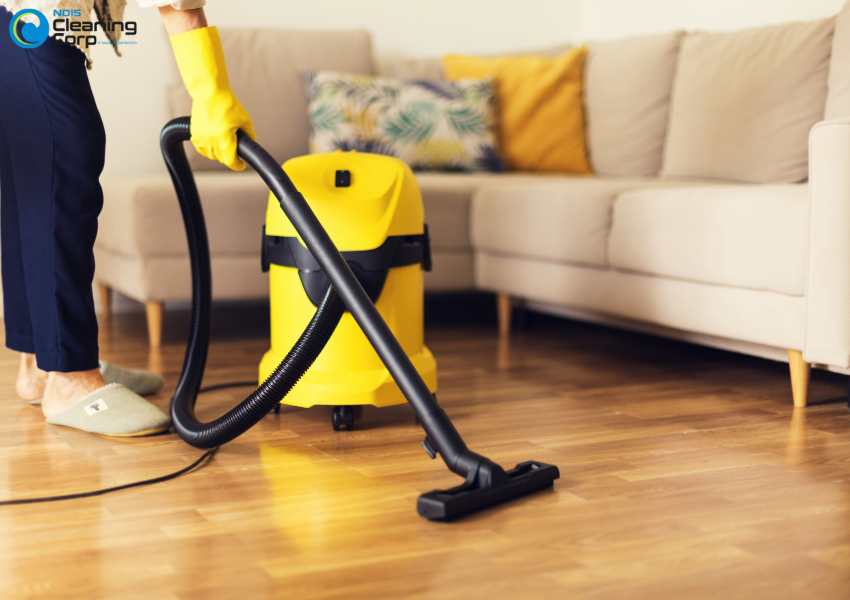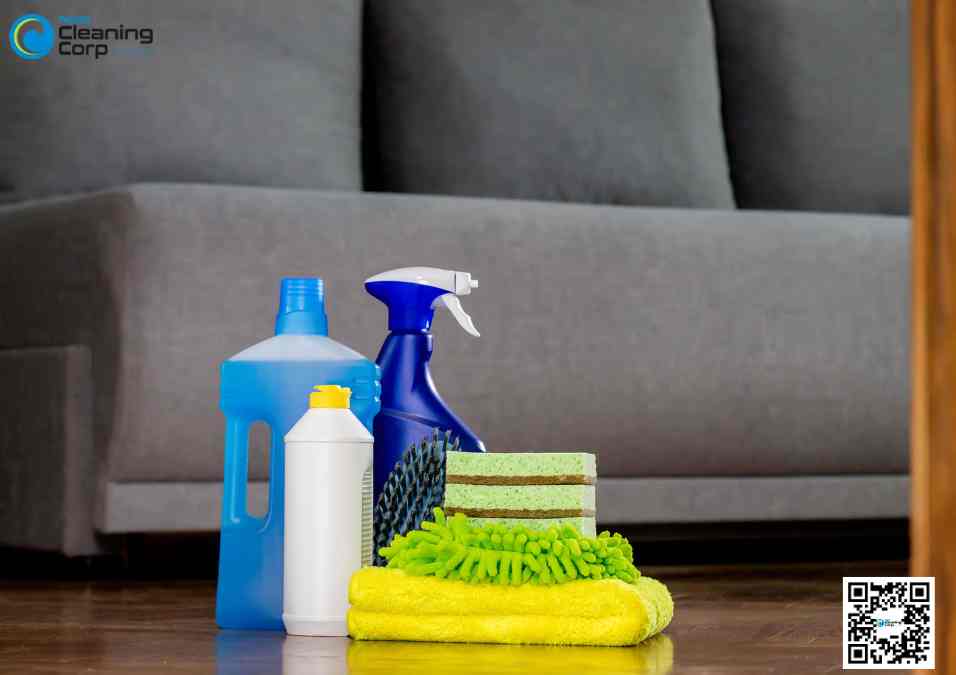Does the NDIS Fund Cleaning Services?
Yes. The NDIS does fund cleaning services — but it...
The link between cleanliness and well-being for NDIS participants is not just about having a tidy space. It goes much deeper than that. Cleanliness has a direct impact on both physical and mental well-being.
As someone who works closely with NDIS participants through NDIS Cleaning Corp., I’ve seen firsthand just how important a clean environment is to their overall health and quality of life. When we talk about cleanliness, we’re not just referring to sparkling floors or freshly wiped surfaces; we’re talking about creating spaces where people feel safe, comfortable, and able to live more independently.
For NDIS participants, this connection between cleanliness and well-being becomes even more critical. Many participants face unique health challenges or mobility restrictions, so a clean and organized environment can truly make all the difference in their daily lives. Whether it’s helping reduce health risks or simply giving someone a better sense of independence, maintaining a clean space can drastically improve their overall quality of life.
Let’s dive into exactly how a clean environment can impact both the physical health and everyday functioning of NDIS participants. In this section, I’ll share some real-life experiences from those I’ve worked with to show how simple acts of cleaning can transform lives in ways you might not expect.

One of the most obvious ways cleanliness affects physical well-being is by reducing the risk of infections and illnesses. A dirty environment can lead to an accumulation of dust, bacteria, and allergens, which can trigger all sorts of health problems, especially for NDIS participants who may already have compromised immune systems or mobility limitations.
For example, Sarah, one of our NDIS participants, struggled with asthma for years. Her home was cluttered and not cleaned as regularly as it needed to be due to her physical limitations. When we started helping her with regular cleaning, the difference in her health was night and day. Before, Sarah would have frequent asthma attacks, which severely limited her ability to enjoy daily activities. After we introduced a strict cleaning routine, including frequent dusting and ensuring proper air circulation, her asthma symptoms drastically improved. It wasn’t just about the cleanliness of her home; it was about the noticeable improvement in her health and how it allowed her to live more freely.
Clean environments can prevent many health issues for NDIS participants, from respiratory infections to allergic reactions. For those who are especially vulnerable, like Sarah, the impact is profound. The act of regular cleaning becomes more than a chore—it becomes a form of health care.
Beyond the obvious health benefits, a clean environment can also improve mobility and foster a greater sense of independence for NDIS participants. Many people don’t realize how cluttered spaces can become a hazard, especially for those with mobility challenges. A home full of obstacles can lead to trips, falls, and even more serious injuries, which can be devastating for someone already dealing with physical limitations.
Take Tom, for example, another NDIS participant we work with. Tom has limited mobility due to a spinal cord injury, and for a long time, his home was filled with clutter—boxes piled up, items scattered across the floor—making it hard for him to move around safely. He was constantly worried about falling and avoided moving more than absolutely necessary.
When we started helping him declutter and reorganize his space, the change in his confidence was almost immediate. By simply clearing pathways, moving furniture, and ensuring the floors were always clean and hazard-free, Tom began to regain his sense of independence. He started moving more freely around his home without the constant fear of falling. This newfound confidence even translated into other areas of his life—he began taking short walks outside with his walker, something he hadn’t done in years.
Support workers, like the team we have at NDIS Cleaning Corp., play an essential role in maintaining cleanliness, especially for participants who may not be able to do it themselves. It’s not just about mopping floors or wiping down surfaces. Our work is much more personal than that. We’re ensuring that our participants live in an environment that’s safe and hygienic, something that’s crucial for their overall health.
For example, one of our participants, Margaret, has limited mobility and isn’t able to manage many of the daily cleaning tasks on her own. When we first started working with her, she was constantly falling ill because her home wasn’t being cleaned regularly. Dust would accumulate, and with her respiratory issues, this led to frequent visits to the doctor. As support workers, our role was not only to clean but to ensure that Margaret’s living space was free from health hazards, like dust, allergens, and bacteria. After a few months of consistent cleaning, Margaret’s health improved dramatically. She wasn’t getting sick as often, and her energy levels were up.
This kind of work isn’t something we do alone. Collaboration between participants and support workers is key. We don’t just go in, clean, and leave. We work with the participants to make sure that the cleaning is done in a way that fits their lifestyle and needs. This teamwork leads to better health outcomes because the participants feel involved and respected in the process.
One of the most important things we do at NDIS Cleaning Corp. is create customized cleaning routines that align with the participant’s physical abilities and preferences. Every participant is different. Some may want to be involved in the cleaning process, while others may prefer us to take the reins entirely.
For example, Linda, one of our long-time participants, enjoys having her space cleaned but also wants to stay involved in the process. She has arthritis, so certain tasks, like scrubbing or reaching high shelves, are difficult for her, but she loves folding laundry and organizing her belongings. To respect her preferences and abilities, we created a routine where we handle the heavier cleaning, and she takes care of the tasks that give her a sense of purpose. This way, she stays involved, and her independence is respected.
Q: Why is cleanliness so important for NDIS participants?
Cleanliness is vital for NDIS participants because it goes beyond just having a tidy space. It’s about preventing health risks, like infections and respiratory problems, which are more common in unclean environments. For someone with physical limitations, an unclean or cluttered space can increase the risk of falls or accidents. But it’s not just about physical health. Mental well-being is also closely tied to cleanliness. A clean environment can reduce feelings of anxiety and stress, providing participants with a space that feels comfortable and calming. Independence is another big factor. When an environment is organized and clean, it’s easier for participants to move around and take care of their daily activities, giving them more confidence and control over their lives.
I’ve seen this firsthand with many of our clients. One of them, Paul, used to feel overwhelmed by the clutter in his home. He struggled to manage it on his own due to mobility issues, which only added to his stress. After we helped him establish a regular cleaning routine, it wasn’t just his physical health that improved—his mood and overall outlook on life did, too. A clean space can really make all the difference.
Q: How can support workers help maintain cleanliness for NDIS participants?
Support workers are essential in helping maintain a clean and safe environment for NDIS participants, especially those who aren’t able to handle these tasks on their own. We do much more than just clean. Support workers assist by creating cleaning routines that suit each participant’s unique needs. Whether it’s daily tidying or more in-depth cleaning sessions, having a plan makes it easier to maintain consistency. We also handle tasks that might be too physically demanding for the participant, like vacuuming, scrubbing, or organizing heavy items.
One of the things I always emphasize to my team is that cleaning isn’t just a chore—it’s a part of creating a space where participants can feel comfortable and empowered. I remember working with Grace, an NDIS participant with arthritis who couldn’t perform many cleaning tasks on her own. Our team stepped in to handle the bigger jobs while also encouraging Grace to be involved in the smaller tasks she enjoyed, like organizing her bookshelves. This partnership between the support worker and the participant is what makes the process not just about cleanliness but about fostering independence.
Q: Does a clean environment really improve mental health?
Absolutely! A clean and organized environment has a profound impact on mental health. There’s actually quite a bit of research backing this up. Clean spaces have been shown to reduce stress, improve focus, and create a sense of calm. For NDIS participants, this is especially important because many are already dealing with significant physical or emotional challenges. When their surroundings are tidy, it helps them feel more in control and less overwhelmed.
One of our participants, Lucy, dealt with depression for years, and her living space reflected her mental state—it was often cluttered and disorganized, which only worsened her feelings of anxiety. When we started working with her, our goal was to create a more peaceful and clean environment. Over time, Lucy noticed that having a clean space made her feel more relaxed and able to focus on other aspects of her life. The change in her living space had a noticeable effect on her overall mood. A clean home isn’t just about aesthetics—it can truly be a part of emotional healing.
Q: How can NDIS participants maintain cleanliness if they have physical limitations?
Maintaining cleanliness can feel overwhelming for participants with physical limitations, but with the right support and tools, it’s entirely possible. First and foremost, support workers are there to step in and handle tasks that the participant might struggle with. But it’s also important to customize cleaning routines that fit the participant’s abilities. For example, breaking down cleaning into smaller, manageable tasks can make it less overwhelming. Using assistive tools, like long-handled dusters or lightweight vacuums, can also make a big difference in what a participant is able to do on their own.
One of our participants, David, had mobility issues and found it difficult to clean his home. We worked with him to create a weekly routine where he handled tasks that were easier for him—like wiping down surfaces or sorting laundry—while we took care of the more physically demanding chores. With this routine, David felt more empowered to contribute to keeping his space clean without feeling frustrated by his limitations.
The link between cleanliness and well-being for NDIS participants is undeniable. Clean spaces not only improve physical health by reducing risks of infections, falls, and other hazards, but they also enhance mental health, providing a sense of peace and control. Whether through their own efforts or with the help of support workers, cleanliness should always be a priority. It empowers participants to live more independently, boosting their confidence and overall quality of life.At NDIS Cleaning Corp., we’ve seen firsthand how impactful a clean environment can be for participants. It’s about more than just cleanliness—it’s about creating a space where participants can thrive, both physically and emotionally.

Yes. The NDIS does fund cleaning services — but it...

Alright, let’s get straight into it. These are the questions...

NDIS cleaning services are specifically designed to cater to the...

The role of professional cleaning in maintaining a safe and...

Studies consistently show that living in a clutter-free, organized space...